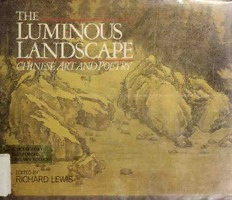
The Luminous Landscape - Chinese Art and Poetry PDF
Preview The Luminous Landscape - Chinese Art and Poetry
i%%r4ft^->?:^f; .>Mi^h^ THE LUMINOUS DSCAP .^T" EDITED BY RICHARD LEWIS — T.L.L. $9.95 HE .UMINOUS LANDSCAPE EDITEDBY • aUt^''''' RICHARD LEWIS ,^,^^* ^ Inthemountains ,_-^- 1 • onesees Human-heartedness Inwater, wisdom. Here, inbrief, istheessenceofaview ofhfeandnaturethatspeakstoustoday with renewed poignancy. It is an in- sightwhich emergedfrom the ancient Chinesecivihzation,andinthisexquis- ite volume are gathered the works of painters and poets of that time who wereabletocapturethisviewthrough theirart.—The bookisdivided intotwo sections mountains and waters since, inChinese,"landscapepainting" can be translated to mean "mountain- waterpicture." Editor Richard Lewis believes that there is no better example ofthe role whichthenaturalworldcanplayinthe spiritual health ofa country than that which existed in China ages ago. The Luminous Landscape, inviting us to walkthroughthemountainsorsitalong cool waters, is a lasting memorial to thatbeliefforourowntime. The Luminous Landscape ZhangLu(activeca. i^oo): "Monk.'''' Hangingscroll,inkonsilk ((JpX55 1/2 inches).CourtesyoftheRoyalOntario Museum, Toronto, Canada. ^ Luminous Landscape CHINESE ART AND POETRY Edited by Richard Lewis •^ DOUBLEDAY & COMPANY, INC., GARDEN CITY, NEW YORK LibraryofCongressCatalogCardNumber79-7691 ISBN: 0-385-14712-0Trade ISBN; 0-385-14713-9Prebound Copyright©1981byRichardLewis AllRightsReserved PrintedintheUnitedStatesofAmerica 98765432 CalligraphybyLorettaPan Theromanizationusedinthisbook,pin-yin,istheofficialsystem thathasbeenadoptedbythePeople'sRepublicofChina. "On Sound," "In the Mountains," "Sitting Alone in Jing-ting Mountain," "Inscribed on a Painting," "Quatrain," "Written at Mauve Garden: Pine Wind Terrace," and "Night" excerpted from SunflowerSplendor by Wu-chi Liu and Irving Yucheng Lo. Copyright© 1975 byWu-chiLiuand IrvingLo. Reprinted bypermission ofDouble- day&Company,Inc. "Among a thousand clouds . . ." and "I climb the road . . ." horn Cold Mountain: 100 Poems by Han-shan, translated by Burton Watson. Reprinted by permission of ColumbiaUniversityPressandJonathanCapeLtd. "The Hill of Hua-Tzu," "The Hill ofthe Hatchet-Leaved Bamboos," and "The Au- tumn Is Beginning" from Poeiiis ofSolitude, translated by Jerome Ch'en and Michael Bullock.Englishlanguagetranslation copyright© i960by Jerome Ch'en and Michael Bullock. Reprinted by permission of Harper & Row, Publishers, Inc. and Abelard- SchumanLimited. "Flowers and Moonlight on the Spring River" by Yang-di, translated by Arthur Waley, from A Hundred and Seventy Chinese Poenis. Copvright 1919 and renewed 1947 by Arthur Waley. Reprinted by permission of Alfred A. Knopf, Inc. and GeorgeAllen&Unwin(Publishers) Ltd. ". . . haze, mist, and the haunting spirits . . ." from An Essay on Landscape Painting by Guo Xi, translated by Shio Sakanishi. Reprinted by permission of John Murray (Publishers) Ltd. "Distant men . . ." ". . . there was one gigantic pine-tree . . ." and "In the evening view . . ." from The Spirit of the Brush, translated by Shio Sakanishi, Reprinted by permissionofJohnMurray (Pubhshers) Ltd. "WrittenWhile Viewingthe Riverin Autumn," "Lotus Pool," "A Poem," "Morning Breaks over the Huai River," "Clouds on the Mountain," "A Forest Lane Covered withMoss,"and "DistantHills"from MoDievtsofRising Mists:A Collection! ofSwig Landscape Poetry, translated by Amitendranath Tagore. Grossman Publishers, 1973. ReprintedbypermissionofVikingPenguin,Inc. "ThoughtsWhile Reading," "Fisherman," and "Inthe Evening I Walk by the River" from 0?ie Hundred Poenis from the Chinese, translated by Kenneth Rexroth. All RightsReserved.ReprintedbypermissionofNewDirections. "Fisher Folk on the River" from The Fenguin Book of Chinese Verse, translated by Robert Kotewall and Norman L. Smith (1962). Copyright © 1962 by Norman L. SmithandRobertKotewall.ReprintedbypermissionofPenguinBooksLtd. ". . . is not water . . ." "Large and small rocks mingle . . ." "When the wind sub- sides . . ." "When the moon is reflected . . ." "Clouds are the ornaments of the sky . . ." and "... a figure should seem . . ." from The Mustard Seed Garden Manual of Fainting by Jie2i Yuan Hua Zhuan, Bollingen Series, translated from the Chinese and edited by Mai-mai Sze. Copyright © 1956, 1963 by Princeton University Press.Excerptsreprintedbypermission. "DuckweedPond,""Atthe Rapids ofthe LuanFamily," "Egret Dyke," "Deep Forest Hermitage," and "Leaving Wang-Chuan Cottage" from Foenis by Wang Wei, trans- lated by Chang Yin-nan and Lewis C. Walmsley. Reprinted by permission of CharlesE.TurtleCo.,Inc.ofTokyo,Japan. "NightRainat GuangKou,"and "Looking at Yue-Tai Mountain from the Lian-Tian Pavilion" from Heaven My Blanket, Earth My Fillow: Foeius froiii Sung Dynasty China by Yang Wan-li, translated by Jonathan Chaves. Reprinted by permission of JohnWeatherhill,Inc. "West Lake," "Miscellaneous Poem at Three Lakes," "The river is white . . ." and "For Three Days I Traveled Through the Mountains; When the Mountains Came toanEndIWasDeeply Moved"fromFilgriin ofthe Clouds:Foemsaf7dEssaysfrovi MingChina,translatedbvJonathanChaves.ReprintedbypermissionofJohnWeather- hill,Inc. InmemoryofGandyBrodie, who,inhisart,alsosoughttheluminous. Alsoeditedby RichardLewis IN PRAISE OF MUSIC THE MOMENT OF WONDER IN A SPRING GARDEN MIRACLES MOON, FOR WHAT DO YOU WAIT? THE WIND AND THE RAIN OUT OF THE EARTH I SING THE PARK OF THIS WORLD JOURNEYS MUSE OF THE ROUND SKY STILL WATERS OF THE AIR THE WAY OF SILENCE THERE ARE TWO LIVES I BREATHE A NEW SONG HuaYan {1682-1-]58): ''TwoMynahBirdsona Branch:ASquirrelLeapingforaWildGrape Vine." (233/4x^2118inches).Courtesyofthe SmithsonianInstitution,FreerGalleryofArt, Washington,D.C. Introduction On a gravestone in China there is an epitaph to the Chinese painter YuanAleng-hui: Inthemountains Onesees Human-heartedness Inwater,wisdom. Here, ifibrief, wastheessence ofaview oflife and nature that speaks to us today with renewed poignancy. It is an insight which emerged from a brilhant civiHzation concerned with probing and expressing the profound relationship between the human experience of nature and na- tureitself. The very laws of that civiHza—tion, in part, were governed by their understanding of this experience and subsequently that civili- zation produced some of the most extraordinary works of art and po- etryknowntotheworld. The basis of this civilization, Dao,* was a belief that all of nature, whetheritbe mountains, rocks, streams, ortrees, was indeed alive. Each element had an individuality that spoke of something more than just — what it was on the surface each had qualities which were charac- teristic of the principles of life. A rock was not simply a rock and a mountain was not simply a mountain: They were vibrant with what theChinesecalled "qi"t orspirit. Forthepoet and painter of China, the — challenge and inspiration was to capture this spirit to dive down into the very center of these things in order to reveal the power and pulsa- tion ofnature as it manifested itself in themselves and the things around •orTao,asitismorecommonlyknownintheoldromanization. tor"ch'i,"asitismorecommonlyknownintheoldromanization.
